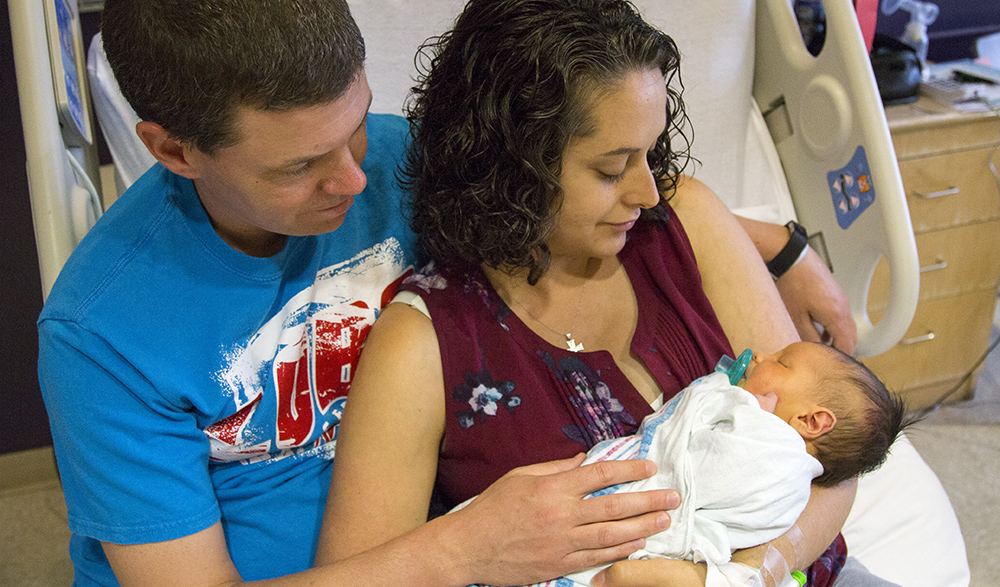When it comes to pregnancy, mom’s health is usually under the microscope. But making a baby is a team effort, and dad’s health and lifestyle is also important—both in getting pregnant and having a healthy baby.
A 2020 study found that newborns whose fathers who had a history of chronic illnesses such as cancer, high blood pressure, diabetes, and depression were at greater risk of preterm birth, low birth weight, and other conditions that required time in the neonatal intensive care unit (NICU). A growing body of research also suggests that a man’s weight, drinking, smoking and other lifestyle factors can influence their children’s health.
If you and your partner are thinking about getting pregnant—or already are—mom shouldn’t be the only one to schedule an appointment with her doctor. Talk with your doctor as well, about your general health, tests you might need, and lifestyle changes that may improve your health and fertility. Here are a few key areas to start the discussion with your doctor.
Dad's Age
The role that age plays in a woman’s fertility and chance of a healthy pregnancy and baby is fairly well documented. But it’s less understood in men.
While a woman is born with all the eggs she’ll ever have and fertility gradually declines in her 30s, particularly after 35, most men make millions of new sperm every day. However, the amount of semen (the fluid that contains the sperm) and sperm mobility (the ability of sperm to move towards and egg) decrease as men age.
We know that the risk of having a baby with a genetic abnormality is higher in women at age 40 than 30. However, there is limited research into similar risks in men at different ages and the results have been mixed.
There have been studies that suggest dads over 40 are at slightly higher risk of having a baby with autism, certain genetic conditions or mental health disorders. This is thought to be because random genetic mutations in sperm occur more commonly in older men. Still, these risks remain small and are less understood than those associated with a mother’s age.
Family History
A baby gets half its genes from its mother and half from its father. If you or a family member have a genetic condition such as a heart defect, certain cancers, cystic fibrosis, or sickle cell disease, there is a possibility the genetic mutation could be passed on to your child.
It’s important that your doctor and your partner's Ob/Gyn or midwife are aware of your family history. Based on this information, you and your partner might be referred for genetic counseling or genetic testing, or prenatal testing once pregnant. Knowing whether the baby is at increased risk for a health condition can help your family plan for the future.
Mental Health
While your physical health can certainly influence your baby’s health, so can your mental health. Depression can affect your parenting practices and your relationship with your partner or family. It also can increase the risk of behavioral problems and physical and mental health problems in children.
Most people think of postpartum depression as something only a new mom gets. But estimates of the number of men who experience elevated levels of depressive symptoms in the months after their baby is born range from 4% to 25%.
Everyone feels sad, stressed, or anxious sometimes. But if these feelings do not go away and begin to interfere with your daily life, talk to your doctor or a mental health professional.
Ways to Help Increase Fertility
There are many things that can affect a man’s fertility. Sometimes a man is born with problems that affect his sperm. It also can be changed by his health and lifestyle later in life. Some medical issues that can reduce the number of sperm or their health include:
- Type 1 diabetes
- Diseases such as mumps or kidney disease
- Radiation treatment or chemotherapy for cancer
- Certain medications, such as some painkillers that contain opiates and medicines that treat depression and anxiety
There are things you can do to help ensure you have plenty of healthy sperm when you’re ready to have a baby.
- Avoid exposure to hazardous substances: This can include pesticides, heavy metals, some chemicals, and radiation.
- Cut back on alcohol: Heavy drinking can affect the quality of your sperm, your sex drive, and the ability to keep an erection. You don’t have to give up alcohol. Just drink in moderation by limiting your intake to two drinks or less a day for men (one or less for women).
- Get tested for sexually transmitted infections (STI): Some STIs can cause infertility. They also can be dangerous, even life-threatening, to a baby if your partner has one while pregnant.
- Keep your testicles cool: Heat can affect the testicles’ ability to make sperm, so avoid hot tubs, saunas, and tight-fitting underwear for a few months before you want to get pregnant.
- Maintain a healthy weight: Being overweight or underweight can affect the quality of your sperm, your sex drive, and can make it difficult to keep an erection. Talk to your doctor about ways to reach and maintain a healthy weight.
- Quit smoking: Smoking can damage the DNA in your sperm and affect your erections. Quitting alcohol can be difficult, but UNM offers resources to help you quit.
Your health—physical and mental—is important at all stages of life. But it’s especially important when you’re about to be a dad. But know that you are not alone. We are here to help you take the steps you need to improve your health, as well as that of your baby and partner.

